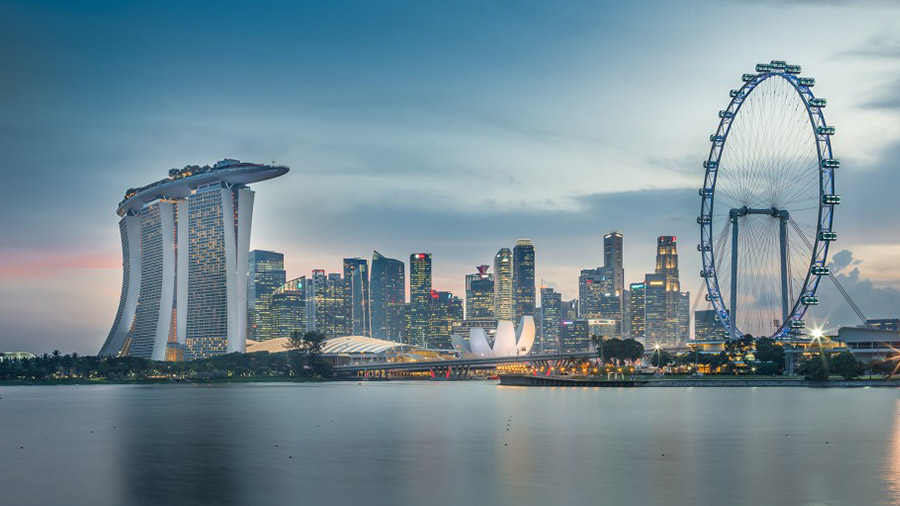What is GST?
The goods and services tax (GST), also known as value-added tax (VAT), is a consumption tax imposed on goods and services in Singapore, regardless of whether they are acquired from domestic or overseas suppliers.
GST is ultimately a consumption tax borne by end consumers, and that various reliefs and vouchers (such as the GST Voucher Scheme) are in place to help lower-income households manage the GST increase.
As GST is a self-assessed tax, and Singapore-based businesses are therefore required to assess their need to register for GST. Companies must register for GST if they:
- Earn a taxable turnover of more than S$1 million (US$737,705) during a 12-month period at the end of the calendar year; and
- Expect to earn a taxable turnover of more than S$1 million (US$737,705) in the next 12 months.
The GST levied on customers is called "output tax," while the GST paid on business purchases, expenses, and imported goods and services is known as "input tax." The net GST payable to the government is the difference between the output tax and input tax.
GST registration
Compulsory registration
You must register for GST if your taxable turnover is:
- Under the retrospective view, more than $1 million at the end of the calendar year; or
- Under the prospective view, expected to be more than $1 million in the next 12 months.
For overseas suppliers, transporters, and electronic marketplaces, the GST threshold is as follows:
- Under the retrospective basis: The entity’s global taxable turnover for the past 12 months exceeds S$1 million in addition to overseas suppliers of business-to-consumer (B2C) products or services to non-registered GST customers that exceeds $100,000 (US$77,000); or
- Under the prospective basis: The entity’s taxable turnover for the next 12 months is expected to exceed S$1 million or where the overseas supplier of B2C products or services to non-registered GST customers is expected to exceed $100,000.
If the customer is not GST-registered, then the obligation to account for the GST may fall on one of the following persons:
- The supplier – who makes the direct sale to the customer;
- Transporters – the person that delivers or arranges to delivery the goods to the customer; or
- The electronic marketplace – which acts as the medium for the supplier to supply low-value goods.
Submit a GST registration application with IRAS
Online applications can be done through the myTax Portal using the company’s CorpPass (a corporate digital identity for companies) with other supporting documents such as the company’s Accounting and Corporate Regulatory Authority (ACRA) Business Profile and Certificate of Incorporation.
Notification from IRAS
The IRAS will send the company a notification confirming that the company is registered for GST. The notification will include:
- The company’s GST number; and
- The company’s effective date of GST registration.
Exception for registration
Entities will not be required to register for GST if:
- Your taxable turnover is derived wholly or mainly from zero-rated supplies and you apply for exemption from registration.
- You are liable for GST registration under the retrospective view not under the perspective view and the following conditions are met:
- You are certain that your taxable turnover for the next 12 months will not exceed S$1 million;
- The taxable turnover is projected to be lower due to specific circumstances (e.g. large-scale downsizing of business); and
- You have supporting documentation to substantiate your projection.
You must nonetheless continue to monitor your taxable turnover at the end of the next calendar year.
Taxable vs. Non-Taxable Goods and Services
The Inland Revenue Authority of Singapore (IRAS) classifies goods and services into two categories: taxable supplies and non-taxable supplies. Companies that are registered for GST must charge GST on all taxable supplies.
Taxable supplies are further categorized into standard-rated supplies, which are taxed at the flat GST rate of 9 percent, and zero-rated supplies, which are untaxed (0 percent GST rate).
Standard-rated supplies that are subject to the 9 percent GST rate include:
- Most locally-sold goods;
- Most locally-provided services; and
- Imported services, such as Business-to-Business (B2B) supplies provided to GST-registered businesses in Singapore, and Business-to-Consumer (B2C) supplies provided to non-GST registered individuals and businesses.
GST will be levied on imported low-value goods (valued up to and including S$400 (US$295)) and B2C non-digital services.
Zero-rated supplies include exported goods (those sold to an overseas customer and shipped to an overseas address) and services included in the List of International Services in Section 21(3) of the GST Act.
Non-taxable supplies are classified as exempt supplies and out-of-scope supplies. The following supplies are exempt from GST:
- Sale and rental of unfurnished residential property;
- Precious metals that are imported or locally sold;
- Financial services; and
- Digital payment tokens.
Goods that are delivered from and to addresses overseas and private transactions are considered out-of-scope supplies.
General GST schemes
|
GST schemes |
Incentive |
|
Hand-Carried Exports Scheme (HCES)
|
Applicable if you wish to zero-rate your supplies to overseas customers for goods hand-carried out of Singapore via Changi International Airport. |
|
Gross Margin Scheme
|
Second-hand dealers who purchased goods free of GST may use the Gross Margin Scheme (GMS) to charge and account for GST |
|
Discounted Sale Price Scheme
|
GST on 50% of the selling price on the sale a second-hand / used vehicle. Entities do not need to seek prior approval from IRAS to use the scheme. |
|
Import GST Deferment Scheme (IGDS)
|
Approved GST-registered businesses pay GST on import payments when their monthly GST returns are due instead of at the point of importation |
|
Tourist Refund Scheme (TRS)
|
GST-registered businesses may provide GST refunds to tourists as an independent retailer or by engaging the services of a Central Refund Agency |
|
Zero GST (ZG) Warehouse Scheme
|
Import GST on non-dutiable overseas goods is suspended when the goods are moved into a ZG warehouse. GST is payable only when the imported goods leave the warehouse and enter the local market. |
|
Major Exporter Scheme (MES)
|
GST on non-dutiable goods is suspended at the point of import and also when the goods are removed from Zero GST warehouses |
|
Cash Accounting Scheme
|
Businesses only have to account for output tax when payment is received |
|
Click here to read more about general industry-related GST schemes on the IRAS website. |
|
Industry-specific GST schemes
|
GST Scheme |
Industry |
|
Approved Import GST Suspension Scheme (AISS) |
For companies operating in the Aerospace industry |
|
Approved Refiner and Consolidator Scheme (ARCS)
|
For refiners and consolidators of investment precious metals (IPM) |
|
Approved Contract Manufacturer and Trader (ACMT) Scheme
|
For companies that have substantial business with overseas clients |
|
Approved Marine Fuel Trader (MFT) Scheme
|
For qualifying businesses in the bunkering industry that make local purchases of approved marine fuel oil ("MFO"). |
|
Approved Marine Customer Scheme (AMCS)
|
For ship owners and ship managers procuring goods for use or installation on internationally bound commercial ships |
|
Approved Third Party Logistics (3PL) Company Scheme
|
For logistics companies that provide logistics management services to overseas clients who use Singapore as a logistics hub |
|
Specialized Warehouse Scheme (SWS)
|
For warehouses that are used for providing specialized storage facilities to overseas persons and most of the qualifying goods stored will eventually be exported |
|
Click here to read more about specific industry-related GST schemes on the IRAS website. |
|
GST liability on low-value goods
Singapore imposes the goods and services tax (GST) on imported low-value goods. Low-value goods refer to goods imported by air or post that are valued up to and including the GST import relief threshold of S$400 (US$301). Non-digital services, such as online training or coaching where the customer is not at the location where the service is being provided, must also pay GST.
GST treatment of media sales
Foreign digital service providers have to register for GST and charge for GST under Singapore’s Overseas Vendor Registration (OVR) regime. Digital services include:
- Downloadable mobile applications, e-books, and movies;
- Subscriptions to TV shows, music, and online gaming; and
- Downloadable drivers, and software.
However, foreign digital service providers will need to have a yearly global turnover of more than S$1 million (US$737,705) and sell more than S$100,000 (US$73,747) worth of digital services to customers in Singapore, before they are obligated to register and charge GST.
The IRAS has underlined the basis for which the supply of media sales will be subject to zero percent goods and services tax (zero-rated GST).
Currently, the supply of media space for online advertising by a taxable person is a zero-rated supply for GST if the advertisement is substantially circulated (at least 51 percent) overseas. Under the changes, if the contractual customer is located outside of Singapore or is a GST-registered person in Singapore, the media sales will be zero-rated.
Like most digital sectors, online advertising has seen immense growth during the pandemic, and coupled with new developments in technology, it has become increasingly challenging for taxpayers to determine whether such media supplies qualify for zero-rated GST.
What do media sales refer to in Singapore?
According to the IRAS, media sales refer to:
- The sale of advertising airtime for broadcasting via radio or TV;
- The sale of media space for online advertising; and
- The sale of advertising space for hardcopy prints such as on billboards, newspapers, and magazines.
The supply of media sales by local suppliers
As stated earlier, the supply of media sales will be zero-rated if it directly benefits a person overseas or a GST-registered person in Singapore.
For the supply of media sales, the comptroller — the person responsible for the quality of financial reporting in an organization — will regard the contractual client as the sole beneficiary of the services if the following criteria are satisfied:
- The service agreement between the media supplier and their contractual client does not require the services to be provided to another party; and
- The supplier only takes instructions from the contractual client for the service.
The supply of media sales by overseas suppliers to GST-registered businesses in Singapore
If an overseas supplier makes a supply of media sales to a GST-registered person/business in Singapore then the recipient, if they are a reverse charge (RC) business, must apply RC and account for GST on the value of their imported services as if they were the supplier, regardless of the place of circulation of the advertisements.
RC businesses refer to those who are subject to reverse charges when they are not entitled to a full input tax credit or belong to a GST group not entitled to the full input tax credit. Previously, the supply of media sales from an overseas supplier to a GST-registered person fell outside the scope of RC if the advertisements were substantially circulated outside of Singapore.
The supply of digital media sales by overseas suppliers to non-GST registered persons in Singapore
The supply of digital media sales by an overseas supplier to a non-GST registered person in Singapore will be subject to GST, under the OVR regime.
The OVR regime was issued in January 2020 and obligates foreign digital service providers to register and pay for GST. Businesses must have a yearly global turnover of more than S$1 million (US$745,381) and sell more than S$100,000 (US$74,538) worth of digital services to customers in Singapore, in the space of 12 months.
Currently, the overseas supplier can only charge GST if the advertisements are substantially circulated in Singapore. The OVR regime is aimed at creating a ‘level playing field’ by protecting local retailers especially since Singapore imports billions of dollars of digital imports yearly.
Property tax
The government increased the marginal tax rates for non-owner-occupied residential properties and for owner-occupied residential properties. The rates are illustrated below:
| Property Tax for Owner-Occupied Residential Properties in Singapore | Effective January 1, 2023 (%) | Effective January 1, 2024 (%) |
| Annual value | ||
| First S$8,000 (US$5,947) | 0 | 0 |
| Next S$22,000 (US$16,356) | 4 | 4 |
| Next S$10,000 (US$7,434) | 5 | 6 |
| Next S$15,000 (US$11,152) | 7 | 10 |
| Next S$15,000 (US$11,152) | 10 | 14 |
| Next S$15,000 (US$11,152) | 14 | 20 |
| Next S$15,000 (US$11,152) | 18 | 26 |
| Above S$100,000 (US$74,344) | 23 | 32 |
| Property Tax for Non-Owner-Occupied Residential Properties in Singapore | Effective January 1, 2023 (%) | Effective January 1, 2024 (%) |
| Annual value | ||
| First S$30,000 (US$22,300) | 11 | 12 |
| Next S$15,000 (US$11,152) | 16 | 20 |
| Next S$15,000 (US$11,152) | 21 | 28 |
| Above S$60,000 (US$44,606) | 27 | 36 |











